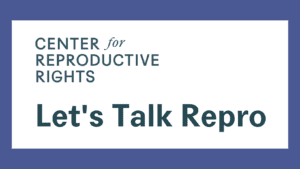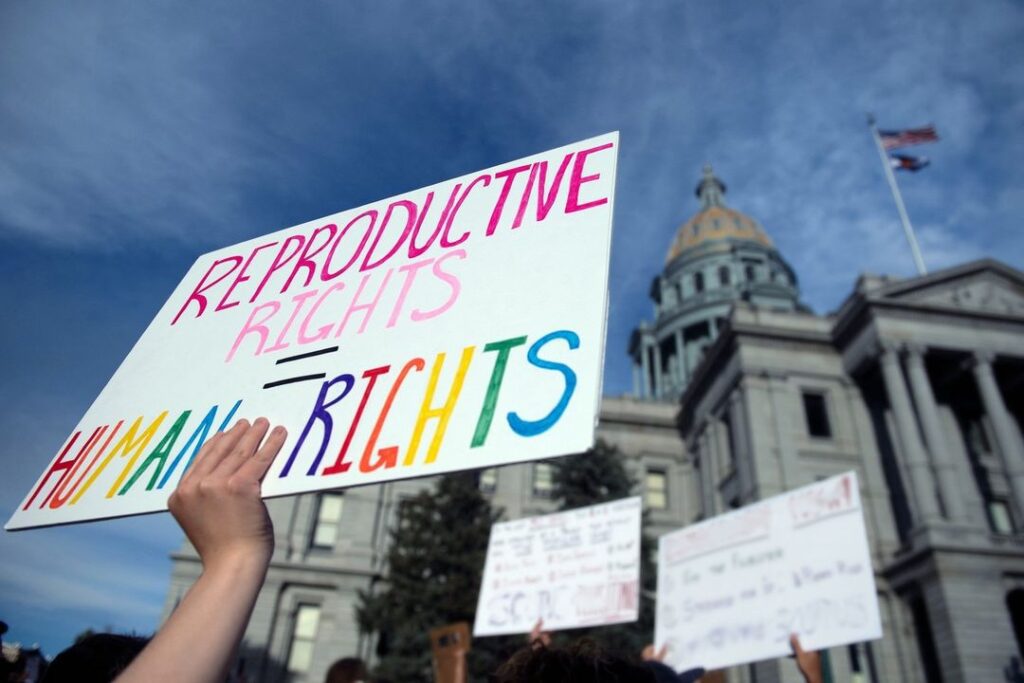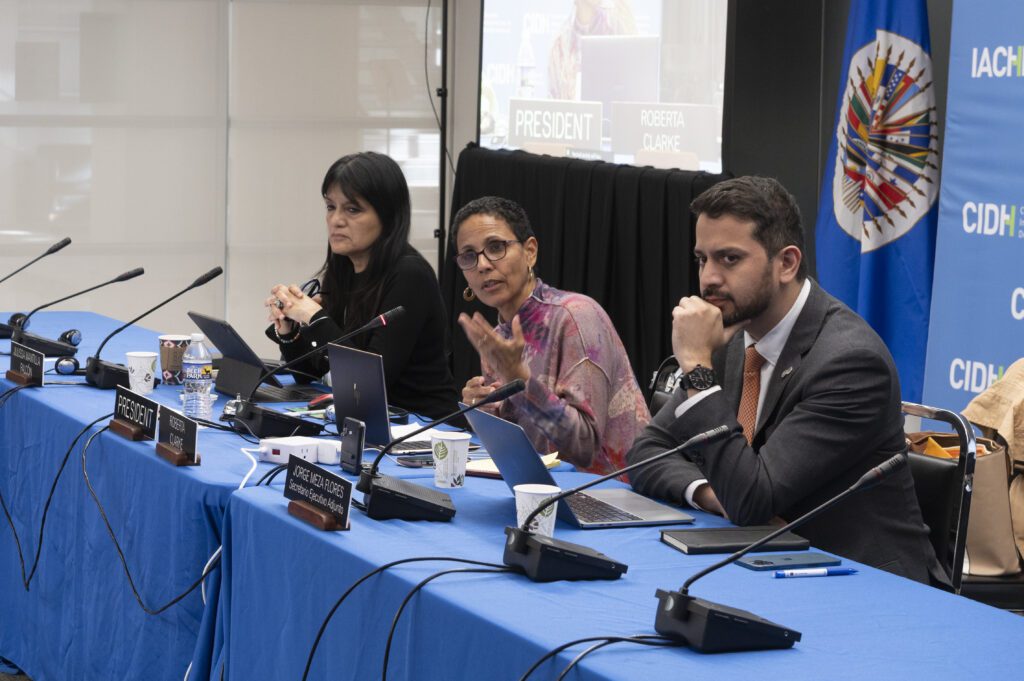“Let’s Talk Repro” Series: Hillary Schneller, Senior Staff Attorney
The co-lead counsel in the Center’s 2022 Supreme Court case discusses her work defending abortion access in Mississippi, Montana and other U.S. states.


“Let’s Talk Repro” is a new series highlighting Center professionals and their work. This is the first article in the series.
Name: Hillary Schneller
Title: Senior Staff Attorney, U.S. Litigation
Pronouns: She/her
Years at the Center: 9
Case highlights:
–Dobbs v. Jackson Women’s Health Organization
–Helen Weems v. State of Montana
–Frederick W. Hopkins, M.D., M.P.H. v. Larry Jegley, et al.
–Planned Parenthood of Greater Texas Family Planning and Preventive Health Services, et al. v. Smith, et al.
–Medical Students for Choice v. Wright
Center for Reproductive Rights Senior Staff Attorney Hillary Schneller has litigated reproductive rights cases across the U.S. for nearly a decade. As co-lead counsel in the Center’s 2022 U.S. Supreme Court case, Hillary represented the last abortion clinic in Mississippi defending the constitutional right to abortion. She has led cases in state and federal court to secure and expand access to abortion, and works on litigation to improve maternal health care in the U.S. Most recently, Hillary presented oral arguments before the Montana Supreme Court in a case challenging a state criminal law that prevents qualified advanced practice registered nurses from providing abortion care.
Listen to this audio clip and read below as Hillary discusses her work at the Center, recent wins that have inspired her, her goals for the future, and more.
Q. What brought you to the Center for Reproductive Rights?
A. Reproductive rights—particularly the intersection with gender equality and the ability to control the course of your life—are so fundamental. I struggled to understand why anyone would want the government to make these important decisions, rather than yourself and your family. There are deeply rooted, systemic reasons the law has been used to marginalize people, but the law can also be an avenue for reversing that and rebuilding something better. That’s why I studied law and focused on women’s rights, LGBTQ+ rights, and reproductive rights.
When I went to law school, I never thought I would do litigation, but an opportunity came to be a litigation fellow at the Center, and I fell in love with both reproductive rights and litigation—and the ability to work directly with our clients, most of whom are abortion providers. They’re everyday heroes when they shouldn’t have to be. It’s been an incredible opportunity to do really impactful work, alongside our partners.
Q. We’re in a very challenging moment for reproductive rights litigation in the U.S. What do some of the current legal attacks on abortion rights have in common? What are some themes you’re seeing?
A. We are seeing an avalanche of attacks on abortion and the broader right to reproductive autonomy, whether it’s contraception or the ability to decide where and with whom one gives birth, and the ability to stay pregnant and birth safely in the U.S. The attacks are immense, and they share a desire to control people’s ability to make decisions about their lives, bodies, and futures. And, as reproductive justice scholars and advocates have emphasized, these attacks are rooted in sexism as well as racism. For example, we know that access to abortion has been integral to many of the gains women have made over the last several decades. Removing that right will propel people who can get pregnant backward.
When the government controls decisions about reproduction and family—whether to force people to give birth, coercively sterilize them, or separate their families—it exerts its control, particularly against Black people and other people of color. We can see that pattern in essentially all attacks on reproductive rights: people in power using the law to enforce stereotypes and to subordinate people.
“There are deeply rooted, systemic reasons the law has been used to marginalize people, but the law can also be an avenue for reversing that and rebuilding something better.”
Q. What are the recent wins that are keeping you inspired and energized?
A. The Center has been litigating in state courts for decades, but our cases at the state level are more important than ever after the U.S. Supreme Court overturned Roe. The wins that we have seen in state courts are really heartening. Recently, the Supreme Court of South Carolina held that the state constitution guarantees a right to abortion and kept an early ban on abortion blocked, which is critical in a region where access to abortion is already decimated. The fact that state courts are receptive to the arguments we’re making—that their constitutions guarantee rights to reproductive autonomy—is exciting and critically important. I’m currently working on cases in Kansas and Montana where, as a result of cases that the Center litigated, state high courts have recognized that their constitutions guarantee a right to abortion. We have been able to leverage these past state rulings to block several restrictions at the state level.
Q. How does your team partner with other organizations to protect reproductive rights at the state level?
A. Litigation doesn’t work in a vacuum; it works in tandem with a broader strategy to secure and expand rights to reproductive autonomy. We work closely with our clients and partners, who are abortion providers, reproductive rights organizations, or reproductive justice organizations working in the policy and advocacy space. We also always partner with attorneys who work in the states where our clients are providing care, and where we are litigating. The creativity, thoughtfulness, and energy that they collectively bring are amazing.
Many of our partners or co-counsel are not just working on reproductive rights, they’re working on issues across the board. So, for example, attacks on reproductive rights share the same goals as attacks on gender-affirming care for trans kids. We are seeing the same people go after those communities, so our ability to work with folks in those spaces helps us make those connections in a better way. Ultimately, we’re all working toward a similar goal, where folks get to make these decisions for themselves and have the resources to make the best decisions for themselves and their families.
Q. What would you like to ultimately achieve with your work within the next year?
A. One concrete legal goal is to keep protections that we have already secured, including in Montana and Kansas, two states particularly important for access to abortion given their location surrounded by states that have been decimated by abortion bans. In addition, of course, I hope that we can expand protections for reproductive rights and reproductive autonomy in other places, but I think it’s important to keep in mind that we’re also trying to defend past wins while working to secure and expand new protections.
Read more about the Montana case.
Helen Weems v. State of Montana
Learn more about our case to defend abortion access in Montana and the road to the state Supreme Court.
Q. Can you provide a brief summary of the Helen Weems v. State of Montana case and the road to the Montana Supreme Court?
A. This involves a little Center history. The Center has been litigating in Montana since our founding 30 years ago. We represented Susan Cahill, a physician assistant, who had been providing abortion care in the state safely for many years until the state passed a law saying only physicians could provide abortion care, really targeting our client. As a result of the litigation we brought with her, the Montana Supreme Court recognized in 1999, in Armstrong v. State, that their state constitution guarantees the right to abortion, and more specifically, the right to abortion from a chosen health care provider. It made clear how important it is for people to be able to have access to a trusted provider, especially when making decisions about health care that affect their personal and reproductive autonomy.
Fast forward almost 20 years: we are now working with a nurse practitioner, Helen Weems. Montana had amended its laws after the 1999 Armstrong case to say physicians and physician assistants could provide abortion care, but then barring other providers, like nurse practitioners, from providing that care. When the state legislature updated its laws, it kind of missed the broader point of the Montana Supreme Court’s decision: that people have the right to access abortion from a chosen, trusted provider—it was not specific to physician assistants. We sued in 2018 on Helen’s behalf to enforce Armstrong, to get the courts to recognize that the principle encompasses nurse midwives and nurse practitioners, both of whom decades of evidence and experience show are excellent, safe, and effective abortion providers.
Thankfully, as a result of our litigation, we obtained an injunction that has allowed Helen to continue to provide for five years and allowed other nurse practitioners to provide abortion care in the state. The current case before the Montana Supreme Court is an appeal of that injunction. We are hopeful the Court will affirm the injunction, allowing Helen and other nurse practitioners and nurse midwives to provide in Montana—a huge and rural state with very few abortion providers.

Q. How do you and your team prepare for an oral argument?
A. All of the Center’s cases are litigated in teams, so we always have a thought partner, someone to brainstorm issues with and puzzle through each tricky question. For the Weems case, I worked with one of our litigation fellows and our co-counsel at the ACLU of Montana to brainstorm the 30 or so hardest questions that may come up at the argument, and the best and most concise answers to those questions. We also hold ‘moots’, where members of the whole litigation team ask questions that they think may come up at the argument, and that’s very good practice for the actual argument.
Q. Why is it essential that nurse practitioners be permitted to provide abortion care in Montana?
A. An overwhelming amount of evidence and experience shows that nurse practitioners and nurse midwives can safely and effectively provide abortion care. There is no reason to bar them from providing that care, particularly in states that don’t have many abortion providers—and, honestly, every state could do with more abortion providers. In Montana, there are about five clinics including Helen’s, which she runs as a nurse practitioner. She’s the only provider there.
Abortion access is dependent on whether you can get access to a provider in many places. If you take one provider out, that means the whole region might not have access. People have to travel to access care. They have to take time off work to arrange to travel for hours, especially in a huge rural state like Montana. They have to pay extra for childcare during the time they’ll be away traveling. It just introduces all these unnecessary burdens on people who are likely already struggling. We know that nationally, 75% of people who access abortion care are living on low incomes. Nobody needs these extra hurdles but especially folks who are already struggling. It’s particularly cruel in addition to being unnecessary.
Q. How will the decision in this case impact abortion access in Montana?
A. If the court rules the wrong way and says the state can bar nurse practitioners and nurse midwives from providing abortion care, that means at least one provider is taken away. Helen will no longer be able to provide abortion care there, which means the Northwest region of Montana is down an abortion provider, which is tremendously devastating for the folks in that area, as well as the folks for whom she provides medication abortion by telehealth.
Just taking away even one abortion provider can have a huge impact on access, and Helen is not currently the only nurse practitioner providing in the state; if the court rules against us, that’s a ruling against other qualified providers, too.
Q. Will a decision in this case have an impact outside of Montana?
A. There are two ways in which a decision can have an impact outside the state. A ruling could impact how other states’ high courts make decisions about abortion care; states look to each other to see how they’re interpreting their similar protections. The other way in which the decision could impact other states is to do with abortion access. Every state has an impact on surrounding states because people are being forced to leave their state to access care wherever it’s available. We’ve seen evidence that wait times in states where abortion is available have increased because so many states have banned abortion and we know that, at least for people who have the resources, they’re going to try to travel out of state to access abortion care.
Q. How can people support the fight to protect abortion in Montana?
A. Talk about abortion! Everyone knows someone who has had an abortion. Simply talking about it contributes to destigmatizing abortion, getting legislators to know that we care about this issue and don’t want more legal restrictions.
The other thing people can do is donate to abortion funds. The Susan Wicklund Fund is an abortion fund in Montana and really makes a tremendous difference in terms of access for folks who are struggling.
And, last but not least: vote. Just this past year, Montana voters rejected a ballot measure that would have restricted access to abortion. Continue to pay attention to efforts on the ballot that try to restrict access to abortion and vote against them, and support measures that would protect rights to abortion and broader rights to reproductive autonomy.


